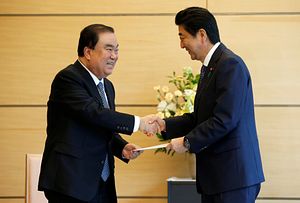On May 18, South Korean President Moon Jae-in’s special envoy to Japan met with Japanese Prime Minister Shinzo Abe. Abe “cheerfully” agreed to the resumption of shuttle diplomacy requested by Moon in the letter that the special envoy delivered at the meeting.
Face-to-face meetings between the leaders of Japan and South Korea have a tortured history. An arrangement – to meet annually and hold the talks alternatively in their respective nations – was originally agreed to by South Korean President Roh Moo-hyun and Japanese Prime Minister Junichiro Koizumi in 2004. Yet the plan fell apart shortly thereafter with Koizumi’s controversial visits to the Yasukuni Shrine. Shuttle diplomacy was revived after Lee Myung-bak became president of South Korea, but dropped again with Park Geun-hye. Ousted President Park never visited Japan during her tenure.
The Japanese and South Korean governments are working to set up a meeting between Abe and Moon on the sidelines of a Group of 20 (G20) summit meeting in Germany this July. They are also trying to arrange a trilateral summit meeting with China, which had been planned for the end of last year, but was postponed due to the domestic turmoil gripping South Korea with Park’s corruption scandal.
Shuttle diplomacy is more important now than ever to demonstrate that both heads of state are committed to working together to deal with the challenge in the region – first and foremost, the North Korean threat.
However, North Korea may not be unifying force that it historically has been in Japan-South Korea relations because Japan’s Abe government and South Korea’s Moon administration appear to be approaching the issue differently. At the same time as Japan is becoming more hawkish about sanctioning North Korea, in a break from nine years of conservative policy, Moon has touted his “dual track” approach: pressure to denuclearize alongside engagement. For example, the Ministry of Unification approved a request by the humanitarian organization Korean Sharing Movement to contact North Korean residents – the first private level meet-up since Pyongyang’s fourth nuclear test in January of last year.
Another issue that could derail Japan-South Korea cooperation is the issue of comfort women. In December 2015, Abe and Park had reached a landmark agreement that was supposedly the “final and irreversible” agreement on the subject between the two countries.
Among other promises, Moon campaigned successfully on a desire to “renegotiate” the agreement, and it appears the issue just won’t go away. In his meeting with Japanese Foreign Minister Fumio Kishida, the special envoy conveyed that, “The atmosphere [in my country] shows that a great majority of South Koreans cannot accept it [the comfort women deal] emotionally.” Kishida responded that Japan’s position was that South Korea should continue to implement the agreement steadily. Within Japan, 61 percent of respondents to a recent Yomiuri Shimbun survey said the government should not agree to renegotiate the deal.
Adding to the difficulty of the issue is a recent UN panel report that recommended reviewing the Japan-South Korea comfort women deal. The Japanese government released a document on May 22 to counter the report. While the December 2015 deal is far from perfect in both process and outcome, it was a step forward. The UN’s report – and Japan’s tone-deaf reaction – is counterproductive.
The Japanese government is also closely watching Kang Kyung-wha, who has been nominated to be South Korea’s next minister of foreign affairs. Her position on North Korea – that further provocations from North Korea would “require stiffer sanctions” but that humanitarian aid “should be addressed separately from political considerations – is largely in line with the rest of the Moon administration. But her background, as deputy high commissioner for the UN Office of the High Commissioner for Human Rights since 2006 and deputy emergency relief coordinator in the Office for the Coordination of Humanitarian Affairs since 2013, is what interests Japan the most. She said on May 25 that she wants to meet with comfort women survivors.
The key phrase in Japan-South Korea relations has been, time and time again, “future-oriented.” Asia’s sad history ought not to be forgotten, and neither should it be taken advantage of. There are more pressing issues facing the two countries.
Defense officials in both countries, as the stewards of their countries’ security and therefore the most sensitive to the challenges that could be posed by North Korea and China in the future, are well aware of this. The Japanese, South Korea, and U.S. governments are moving forward to arrange trilateral talks between the defense ministers on the sidelines of Asian Security Summit. The talks, between Japanese Defense Minister Tomomi Inada, U.S. Defense Secretary Jim Mattis, and South Korean acting Defense Minister Han Min-goo, are scheduled for June 3. Another positive sign of military affairs being shielded from the travesty of domestic politics is the fact that the November 2016 General Security of Military Information Agreement (GSOMIA), another major Japan-South Korea breakthrough, was never a flashpoint in the campaign.
































